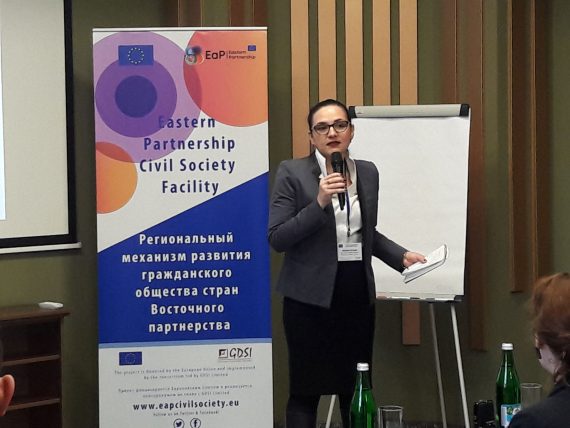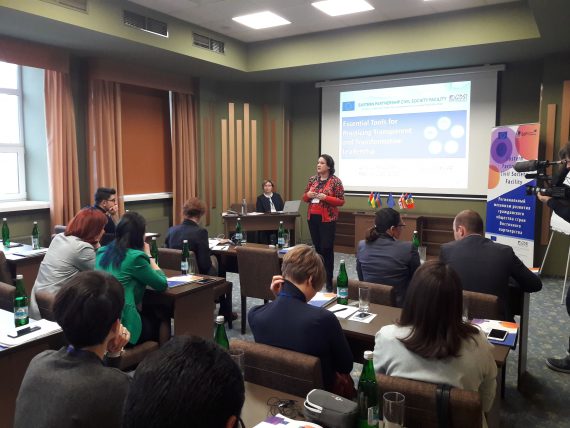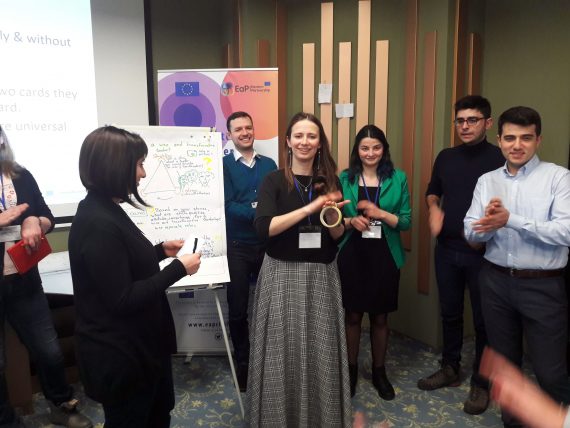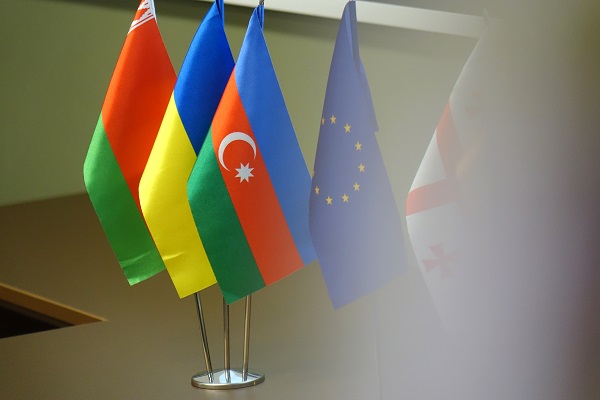On February 16, 2018, 21 young Civil Society Fellows from Armenia, Azerbaijan, Belarus, Georgia, Moldova and Ukraine convened in Kyiv to enhance their leadership skills and discuss the progress of their projects during the mid-term event organised by the Eastern Partnership Civil Society Facility.

At the beginning of the event Ms. Sinziana POIANA, the Policy Officer for Civil Society Support of the European Commission, DG NEAR, has addressed to the audience and outlined the recent milestones in EaP Civil Society Fellowship Programme’s implementation and underscored the unwavering commitment of the EU to support the development of stronger civil societies in the EaP countries. “In 2015, the EU has enabled the EU Neighbourhood Policy review, and, in this Communication, we have committed ourselves to invest more in building leadership of young leaders of civil society organisations through the Civil Society Fellowship Programme. Last year we have also committed to include civil society in the so-called 20 Deliverables for 2020 in the Eastern Partnership. […] your Programme is one of the landmark deliverables for us,” she stressed.
EU priorities and expectations from the leadership training were further confirmed during the capacity need assessment carried out by the Eastern Partnership Civil Society Facility among the Civil Society Fellows-2017 when the majority of respondents indicated the necessity of learning more about essential tools for practicing transparent and transformative leadership.
To meet the demand, the mid-term event included a dedicated training on the topic. It was conducted by Ms. Lyubov PALYVODA, GDSI Consultant and President of CCC Ceative Center (Ukraine). The trainer walked the participants through the historical path along which the definition of “leader” evolved from the early 1900’s “great man” theory that posited the leadership ability as something one can only be born with to the current idea of a leader who can be educated and trained for the job.
In presenting their visions of what makes a real leader, identifying the leader’s role in community transformation and discussing different styles of leadership, the participants learned more about their colleagues, themselves and their development potential.
 Ms. Lyubov PALYVODA: “My most important lesson is that a leader of an organization should have a vision, share it and remember where he/she is moving in order not to end up in a different place. A leader has to have a vision of what he/she wants to do and what he/she wants to leave after him/her; a vision of what he/she can change and a vision of not how good his/her organization is, but rather how big it can become. A leader today should focus his/her efforts on elaboration of a future-oriented vision of the organization instead of just planning its strategies.”
Ms. Lyubov PALYVODA: “My most important lesson is that a leader of an organization should have a vision, share it and remember where he/she is moving in order not to end up in a different place. A leader has to have a vision of what he/she wants to do and what he/she wants to leave after him/her; a vision of what he/she can change and a vision of not how good his/her organization is, but rather how big it can become. A leader today should focus his/her efforts on elaboration of a future-oriented vision of the organization instead of just planning its strategies.”
The second part of the day was dedicated to networking exercises and group discussions on leadership skills, qualities, competencies and roles in transforming communities. The discussions were facilitated by Victoria LUCHKA, a current Civil Society Fellow and the Member of the Board of the Institute of Ukrainian Studies, NGO (Lviv, Ukraine).
Ms. Victoria LUCHKA: “All ideas and approaches to working with groups I acquired during my internships in Denmark and the Netherlands in the framework of this EaP Civil Society Fellowship Programme, where I learned about Art of Hosting facilitation method. It is based on a fundamental idea of communication between individuals bringing more outputs than separate efforts of each one of them. It is only through communication that we are able to find some new unique ideas, come with solutions and resolve conflicts. It is much more efficient to mix people around a task that will make them think and look at it from different angles then to separate them to work on individual tasks. This allows brewing good ideas and new solutions and makes the participants feel engaged through equal ownership of the solution they have jointly developed without being pressed. This holds truth for them and keeps them ready to go on”.
 In a separate exercise, the Fellows tried their hand in shaping advice and recommendations for their successors, future Civil Society Fellows to be selected during the next coming Call for Applications slated for March 2018. The ‘joint advisory’ will be offered to potential applicants before they bid to participate in the Eastern Partnership Civil Society Fellowship Programme.
In a separate exercise, the Fellows tried their hand in shaping advice and recommendations for their successors, future Civil Society Fellows to be selected during the next coming Call for Applications slated for March 2018. The ‘joint advisory’ will be offered to potential applicants before they bid to participate in the Eastern Partnership Civil Society Fellowship Programme.
In her wrap-up address Ms. Sinziana POIANA noted: “Together with the Project team we are trying to build leadership skills of civil society leaders in the EaP region, which is why we are holding this event today. This event is a mid-term reunion of 20 civil society fellows selected in 2017. And we have been spending the whole day today listening to very inspiring and motivating discourses on their ambitions for their countries and their communities. And this is a message that I will take back to Brussels and it will be used to inspire our future programmes.”
Background information: In October 2017 twenty young civic activists from six Eastern Partnership countries has been awarded Fellowships under the Eastern Partnership Civil Society Facility to pursue a programme of activities that will allow them to develop their leadership skills, and enhance their contribution to civil society development in their respective countries. This support is an investment in the development of young current civic activists or civically minded individuals from the EaP region, who display the interest and ability of taking leading roles in the growth of their societies. The Fellowship programme contributes to the broader aims of EU support to civil society development in this region.
The Fellows’ chosen topics for the work programme of the Fellowship covers a range of priority areas in the civil society realm – e.g. addressing the needs of local communities through engagement in participatory decision-making, monitoring and analysis of policy implementation and the work of government institutions (at local, municipal, national levels), capacity-building and networking among CSOs. The outputs anticipated by the end of the Fellowship period (awards are made for activities lasting up to 6 months) include policy papers on a range of important themes, e-learning course materials, visualisation of archive material, and the establishment of functioning networks of activists.




